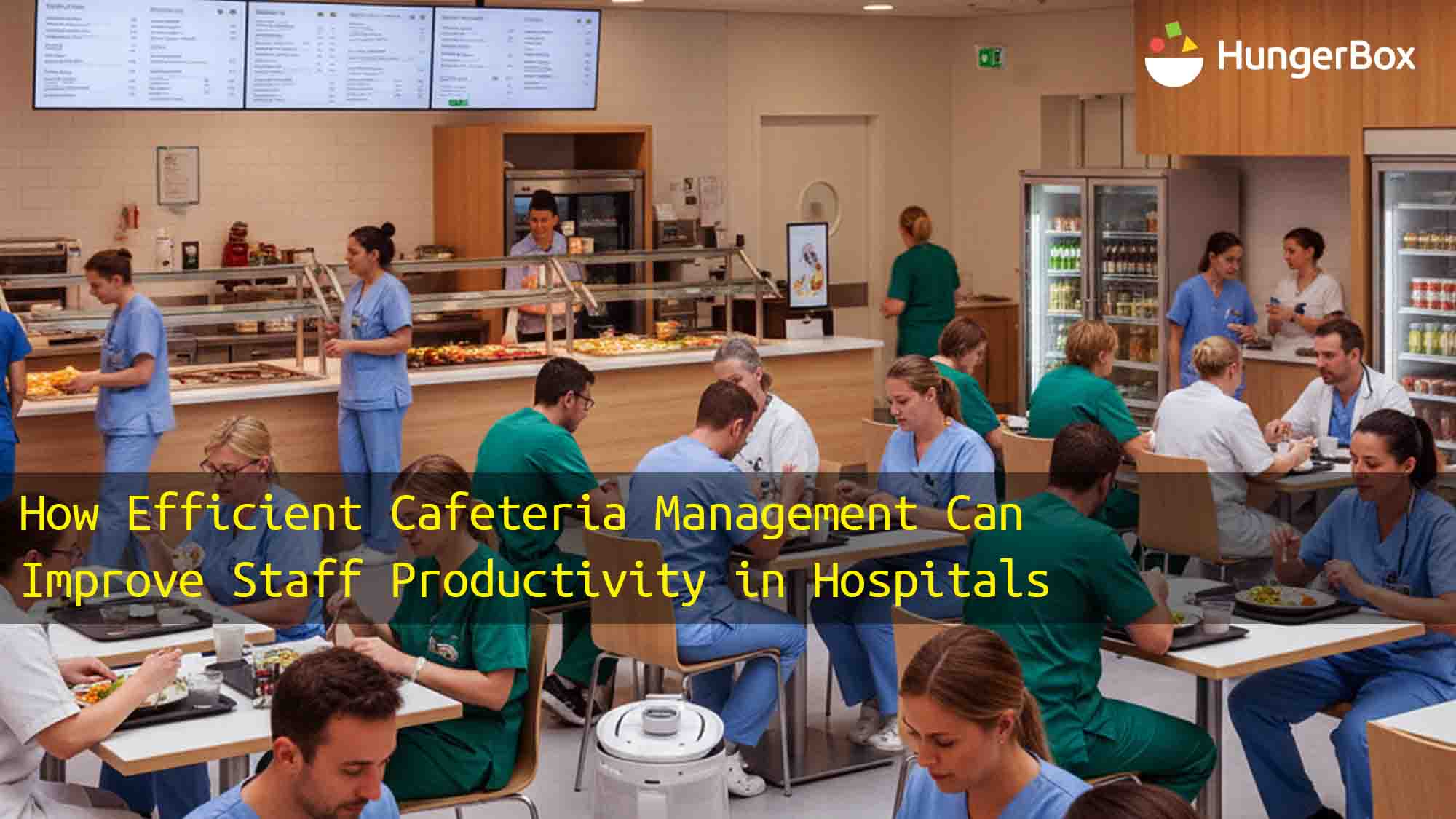
How Efficient Cafeteria Management Can Improve Staff Productivity in Hospitals
In hospitals, every second counts. Doctors, nurses, and support staff often work long, demanding shifts that leave little time for meals. Yet, the quality and efficiency of hospital cafeteria management directly impact staff productivity, morale, and overall well-being. When hospitals adopt smart cafeteria solutions, they not only enhance healthcare dining experiences but also contribute to a more efficient, healthier, and engaged workforce.
Why Hospital Cafeteria Management Matters
Hospital staff operate in high-pressure environments. Breaks are short, meal timings are irregular, and energy levels need constant replenishment. Traditional cafeteria systems, marked by long queues, limited food options, and outdated payment processes, drain time and add stress. Efficient cafeteria management ensures staff get access to fresh, healthy meals quickly, enabling them to focus on patient care instead of worrying about food.
Smart cafeteria solutions in hospitals bring automation, transparency, and convenience. From mobile ordering to real-time menu updates and contactless payments, these digital upgrades streamline healthcare dining and eliminate bottlenecks.
Key Benefits of Efficient Cafeteria Management in Hospitals
Reduced Waiting Times = More Time for Patients
Hospital employees cannot afford to spend 20 minutes in line for lunch. Smart cafeteria solutions enable pre-ordering, time-slot scheduling, and digital meal pick-ups, which significantly reduce congestion during peak hours. This allows staff to maximize their breaks and return to duty refreshed and on time.
Healthy Meals Drive Higher Productivity
Staff productivity is closely linked to nutrition. With efficient hospital cafeteria management, healthcare dining menus can highlight nutritional values, offer dietary filters (low-sodium, high-protein, vegan, etc.), and integrate with wellness programs. Access to balanced meals improves focus, reduces fatigue, and supports better decision-making in high-stake medical environments.
Seamless Integration with Hospital Systems
Modern cafeteria platforms can connect with hospital ID cards or access systems, enabling cashless, hassle-free transactions. Meal subsidies can be applied automatically, ensuring fairness and reducing administrative work. Integration with HRMS also allows hospitals to track meal usage patterns, optimize subsidies, and align food services with employee wellness initiatives.
Enhanced Hygiene and Safety Compliance
Healthcare dining must adhere to the highest hygiene standards. Smart cafeteria solutions include digital checklists, vendor audits, and allergen tagging for every meal. This reduces food safety risks while providing staff with transparency and confidence in what they consume. In a post-pandemic era, contactless menus and QR-based ordering further minimize infection risks.
Data-Driven Efficiency
Hospital cafeterias often struggle with overproduction and food wastage. With data-driven inventory tracking, administrators can forecast demand based on attendance, shifts, and historical consumption patterns. This reduces waste, optimizes vendor performance, and lowers operational costs—all while ensuring meals are available when staff need them most.
Supporting Staff Morale and Retention
A well-managed cafeteria is more than a food service—it’s a morale booster. Staff who feel cared for through accessible, healthy dining options are more engaged, less stressed, and more likely to stay loyal to the institution. In an industry where retention is critical, efficient cafeteria management can make a tangible difference.
Real-World Impact: How Cafeteria Efficiency Helps Hospitals
Consider a large hospital with multiple departments and 24/7 operations. With traditional dining models, queues during shift changes overwhelm the cafeteria, leading to wasted time and food shortages. After adopting smart cafeteria solutions, the same hospital can:
- Reduce average meal wait times by up to 60%
- Cut food waste by 30–40% through accurate forecasting
- Improve staff satisfaction scores with healthier, transparent dining
- Align meal services with shift rotations, ensuring availability around the clock
The ripple effect is clear: better cafeteria management translates into more productive staff and improved patient care.
Future of Healthcare Dining
The future of hospital cafeteria management lies in personalization and automation. AI-driven demand forecasting, real-time feedback loops, and integration with staff wellness programs will make healthcare dining smarter and more efficient. Hospitals that embrace these innovations will not only save costs but also strengthen staff performance and well-being.
Efficient cafeteria management is no longer a “nice-to-have” for hospitals—it’s a necessity. By adopting smart cafeteria solutions, healthcare institutions can create dining environments that save time, improve nutrition, reduce waste, and enhance staff productivity. In an industry where lives depend on alert, energized professionals, healthcare dining is not just about food—it’s about fueling better care.
Ready to Transform Your Hospital Cafeteria?
Explore how smart dining technology can revolutionize your staff experience with HungerBox’s hospital cafeteria management solutions.
You can schedule a demo to see our platform in action, contact us for personalized consultation, or learn more about us and our mission to make healthcare dining smarter and more efficient.
Frequestly Asked Questions

Efficient cafeteria management saves time by reducing waiting lines, streamlining meal ordering, and ensuring quick service. This allows hospital staff to enjoy nutritious meals and return to duty refreshed, improving overall productivity.

Smart cafeteria solutions provide convenience through digital ordering, contactless payments, and personalized menus. They help hospital employees access healthy meals faster, leading to better focus, reduced fatigue, and improved job satisfaction.

Yes. Modern hospital cafeteria platforms integrate with staff ID cards, HRMS, and access systems for cashless payments, meal tracking, and automatic subsidy management, simplifying operations and ensuring transparency.

Data-driven cafeteria solutions use analytics to forecast demand, track consumption, and optimize inventory. This reduces overproduction, minimizes food waste, and helps hospitals save on operational costs while maintaining quality service.

Investing in a digital cafeteria management system improves efficiency, food safety, and staff morale. It enhances meal convenience, reduces administrative load, supports sustainability goals, and ultimately boosts hospital performance.